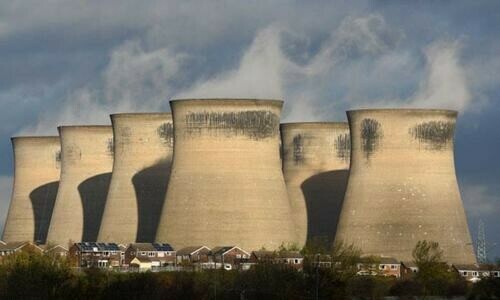IN a power sector grappling with crises and conundrums, where opinions and proposed solutions diverge, one unifying consensus emerges — the imperative for change. The status quo remains untenable, demanding a transformative shift from the current trajectory.
From demand suppression and sluggish industrial growth to exorbitant tariffs, escalating project costs, capital shortages, dollar-indexed returns, and overly favourable returns for investors — the litany of issues plaguing the power sector necessitates a comprehensive overhaul.
As countries strategise for a future in a power domain divorced from fossil fuels — despite leveraging this resource for the major part of the last century — Pakistan steadfastly affirms its tacit commitment to harnessing its untapped ‘black gold’, reflecting this in conversations, discourse, policies, and political slogans. It all boils down to a matter of our ‘national interest’, and any perspective misaligning with this stance is, at the very least, deemed contentious.
Pakistan is grappling with limited capital for sustainable development, let alone substantial investments in the power sector. Foreign lending has traditionally paved the way for setting up crucial projects.
However, China and other reliable backers of Pakistan’s power sector have abandoned the coal paradigm internationally, embracing environment-friendly renewable energy alternatives.
The financing of coal power outside of China has hit its lowest point since 2010, and the doors of new Chinese funding for Pakistani coal projects have remained shut since 2021. The International Finance Corporation, responsible for supporting some of the largest power projects in Pakistan, has washed its hands clean of coal.
Even the International Monetary Fund is firmly asking the country to make only climate-resilient future investments. Countries and entities that have not jumped onto the bandwagon yet remain under extreme pressure and scrutiny to do so; something bound to increase as the climate crisis worsens.
The proposed coal capacity has shrunk by 72pc.
Globally, coal remains a losing bet. Over the past nine years, proposed coal capacity has shrunk by 72 per cent — and the trend is expected to continue. Even India has paused plans to add new coal plants for at least five years. Outside of China, only two coal power stations reached financial close in 2022, in Zimbabwe and the Philippines. Neither of them were greenfield projects.
The narrative of our national interest in coal is linked with improving our energy security by reducing the import of fuels. An oft-peddled narrative is that Europe increased its reliance on coal amidst the Russia-Ukraine crisis, hence paving the way for developing countries such as Pakistan to prioritise their own local development through fossil energy.
However, according to Ember, a global energy think tank, EU-wide generation through coal fell by 23pc in the first half of 2023, accounting for less than 10pc of the region’s electricity generation.
While 14GW of coal power projects were put on standby to meet the shortfall due to Russian gas, no European country reversed its commitment to phase out coal by 2030 at the latest, relying on renewable energy and natural gas instead.
A national interest narrative pegged on local coal development is costing the nation dearly in its perception battles too. While international investment might not be available for coal, our failure to secure any bidders in the recent solar auctions for 600MW in Muzaffargarh highlighted a budding investor crisis.
For the most expensive power producer in the region, renewable energy is required to provide the flexibility that will drive down consumer costs. While the nation has set ambitious renewable energy targets (30pc capacity by 2030), any discourse around prioritising renewable energy over coal is met with reasoning around system constraints and national interest.
In sharp contrast to the declining health and financing for coal, a key agenda item on the COP28 table is the tripling of global finance available for renewable energy for developing countries. As countries transform their power systems and modernise them to capitalise on the shifting winds, Pakistan has chosen to peg its growth on a losing bet.
The truth at hand is that the usual avenues for funding coal projects, either directly or indirectly, remain heavily scrutinised or firmly shut.
Unless Pakistan’s economy is ready to bear the impact of developing coal power projects through self-finance — and the associated losses for renewable energy development due to negative perception and optics, coal development will remain at odds with the interests of the country. It is high time those in power rethink the role of coal in our development — for the national interest of Pakistan.
The writer is programme manager at Renewables First, an energy transition think tank based in Pakistan.
Published in Dawn, December 2nd, 2023















































Dear visitor, the comments section is undergoing an overhaul and will return soon.